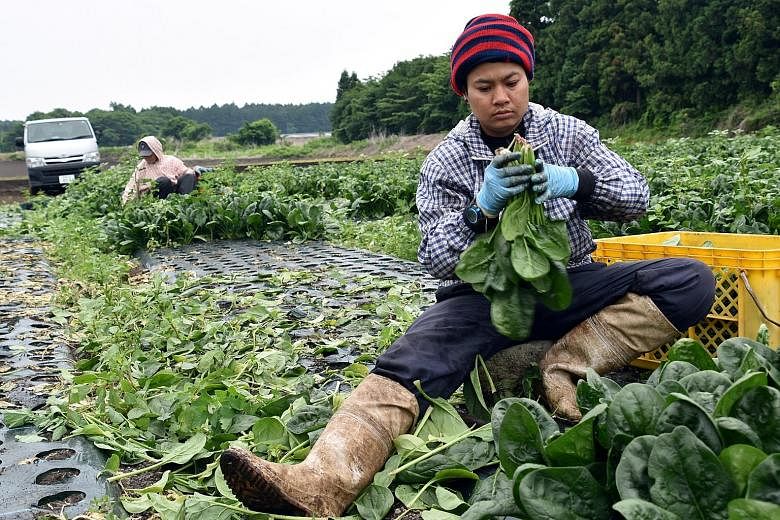TOKYO • Mr Shinichiro Tsukada said his plastering firm in Tokyo would not survive without the 22 Chinese and Vietnamese workers who make up half his payroll.
"They're treasures, real treasures," he said.
"Workers are disappearing as our population ages. Buildings cannot be built because there aren't enough workers... We have no choice but to allow them into the country."
Across Japan, hotels, farms and construction sites are feeling an intensifying labour crunch as the worker pool shrinks and demand rises ahead of the 2020 Tokyo Olympics.
That is prying open the country's restrictive immigration policies, which until now have only allowed a trickle of so-called unskilled foreign workers into the country.
Driven by economic and demographic forces, the Council on Economic and Fiscal Policy, which is chaired by Prime Minister Shinzo Abe, yesterday announced plans to create a new, five-year permit system to accept 500,000 low-skilled non-Japanese labourers by 2025.
They will work in five industrial sectors that have been suffering from acute labour shortages - construction, agriculture, nursing, hotel and shipbuilding - reported Japan Times.
Details of the new system - including what kinds of tests applicants must pass - have yet to be decided, government officials said.
Mr Yoshio Kimura, chairman of the ruling Liberal Democratic Party's special committee on issues related to foreign workers, told the Japan Times in an interview: "Some 500,000 is not enough at all. Some people who don't know about the reality (of the Japanese economy) must have just made up that figure."
Two years ago, the committee called for letting in more than 900,000 new foreign labourers.
If the new measures are approved by the Cabinet, the government aims to have Parliament make them into law later this year.
Although the authorities are reluctant to describe the steps as part of immigration policy, they mark a turn towards a more open Japan.
"We are reaching a point where if we don't start thinking about immigration, then Japan's future will be in danger," said Mr Toshihiro Menju, who is the managing director of the Japan Centre for International Exchange.
The number of all types of foreign workers in Japan has risen steadily in recent years to 1.28 million - about one per cent of the population - more than doubling from 486,000 in 2008.
The biggest increases are in two categories: foreign students, who are permitted to work 28 hours a week; and people on a technical intern programme, which lasts up to five years before participants must return home.
Many trainees see such internships as a way to earn more money than they would at home, while Japanese businesses hire them to do undesirable jobs that are hard to fill.
The new permits are meant to bring more workers into that pool and have been applauded by the Japan Chamber of Commerce and Industry, a group of small and medium-sized businesses that have been hit hardest by the crunch.
Although public attitudes are shifting, there is concern that an influx of foreigners will upset the social order, increase job competition and weaken traditions.
In Japan's rapidly ageing countryside, agriculture is becoming dependent on foreign workers for survival.
Mr Shouji Sawaura, 54, said he simply cannot hire enough locals at his farming business, Green Leaf, in central Gunma prefecture, where he grows spinach, cabbage and other vegetables.
He relies on 24 workers from Thailand and Vietnam who operate machinery in a factory that makes pickles and shirataki noodles.
"We need a system that allows in foreigners for these kinds of jobs," instead of relying on temporary trainees, he said.
REUTERS

